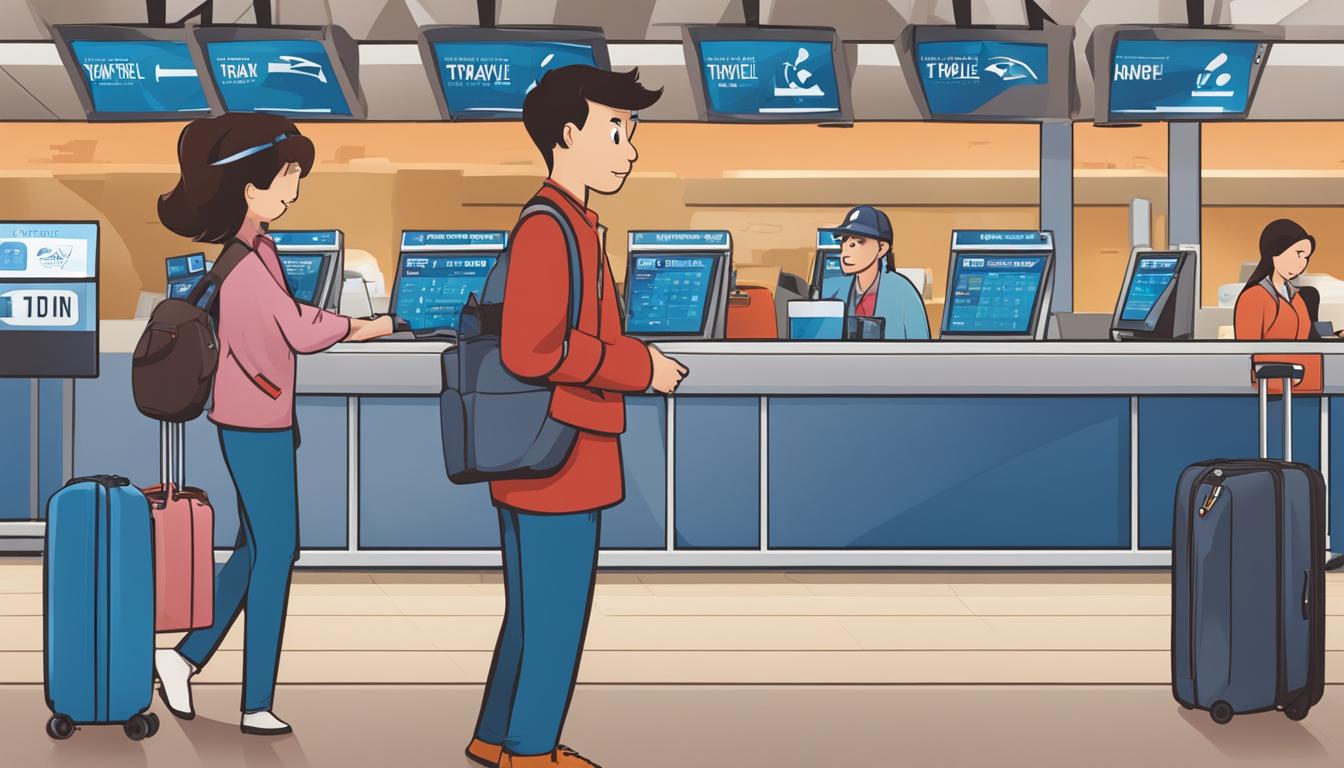travel insurance is it worth it

Planning a trip can be an exciting and exhilarating experience. From choosing the destination to booking accommodations and activities, there is so much to look forward to. But amidst all the excitement, one question often comes to mind: is travel insurance worth it?
Travel insurance is designed to provide financial protection and peace of mind during your journey. It can cover a range of unforeseen circumstances, such as trip cancellations, lost luggage, and emergency medical care. But before you decide whether to invest in travel insurance, it’s essential to understand its benefits and limitations.
Key Takeaways:
- Travel insurance can protect you from financial loss due to trip cancellations, lost luggage, and medical emergencies.
- It is particularly valuable for nonrefundable trips and when your regular health insurance doesn’t cover international medical treatments.
- Travel insurance typically costs between 5% and 10% of the total trip price.
- Read the policy carefully to understand what exactly your travel insurance covers and any exclusions or limitations.
- Consider buying travel insurance when the upfront costs of your trip are nonrefundable or when there are concerns that may lead to trip cancellation or delay.
What Does Travel Insurance Cover?
When planning a trip, one of the most important considerations is travel insurance. Understanding the coverage provided by travel insurance is crucial in making an informed decision. Let’s explore the benefits of travel insurance and the various aspects it covers.
Trip Cancellation
One of the key benefits of travel insurance is trip cancellation coverage. If you need to cancel your trip due to unforeseen circumstances such as illness, injury, or extreme weather, travel insurance can reimburse you for the nonrefundable expenses you’ve already incurred.
Travel Medical Expenses
Travel insurance also provides coverage for medical expenses while you’re away from home. It can help cover the costs of doctor visits, hospital stays, lab work, and prescribed medications, ensuring that you receive the necessary medical care without incurring a significant financial burden.
Baggage Insurance
Lost or stolen luggage can be a traveler’s nightmare, but with baggage insurance, you can have peace of mind. Travel insurance typically includes coverage for lost, damaged, or stolen luggage, allowing you to claim reimbursement for the depreciated value of your belongings.
Overall, travel insurance offers comprehensive coverage for various aspects of your trip. From trip cancellation to medical expenses and baggage insurance, it provides financial protection and peace of mind, allowing you to enjoy your travels worry-free.
Trip Cancellation Insurance
When planning a trip, unexpected events can sometimes disrupt your plans. That’s where trip cancellation insurance comes in to provide financial protection. This type of insurance covers the cost of prepaid and nonrefundable expenses if you have to cancel your trip for a covered reason.
There are several situations that may qualify for trip cancellation insurance, such as illness, injury, extreme weather conditions, flight cancellations, or even legal obligations. By having this insurance coverage, you can receive reimbursement for the missed expenses and avoid financial loss.
It’s important to carefully review your policy to understand the specific coverage and exclusions. Different insurance companies and plans may have varying terms and conditions, so reading the fine print is essential. By doing so, you can ensure that you have adequate coverage for the situations that are most relevant to your travel plans.
Benefits of Trip Cancellation Insurance:
- Protection against unexpected cancellations
- Reimbursement for prepaid and nonrefundable expenses
- Financial safety net in case of covered reasons
- Peace of mind for travelers with nonrefundable bookings
With trip cancellation insurance, you can have peace of mind knowing that your investment in travel is protected. In case of unforeseen circumstances, this insurance can help alleviate the financial burden and enable you to reschedule or receive reimbursement for the missed trip.

Travel Delay Insurance
Travel delays can be frustrating and disruptive to your plans. Whether it’s due to a mechanical failure, inclement weather, or even a stolen passport, unexpected delays can happen when you least expect them. That’s where travel delay insurance comes in to help alleviate the financial burdens that come with these situations.
With travel delay insurance, you can be reimbursed for the expenses you incur during the delay, such as meals, travel, and accommodation. This coverage provides a per-day maximum amount to ensure you have the necessary resources to navigate the unexpected delay.
One of the key benefits of travel delay insurance is its coverage for circumstances beyond your control. It offers peace of mind, knowing that you won’t be left stranded or out of pocket due to circumstances like flight delays or cancellations. Instead, you’ll have the financial support you need to make alternate arrangements and continue your journey smoothly.
Key features of travel delay insurance:
- Reimbursement for meals, travel, and accommodation during the delay
- Coverage for delays caused by mechanical failures, inclement weather, and stolen passports
- Financial protection for unforeseen circumstances that disrupt your travel plans
- Peace of mind knowing you won’t be left stranded or out of pocket
So, before your next trip, consider adding travel delay insurance to your travel insurance plan. It’s a valuable safeguard against unexpected delays and ensures that you have the support you need during these situations. With travel delay insurance, you can focus on enjoying your trip with peace of mind, knowing that you’re protected.
Trip Interruption Insurance
Trip interruption insurance is an essential component of travel insurance that provides peace of mind in case your trip is cut short due to unforeseen circumstances. Whether it’s a sudden illness, a family emergency, or severe weather at your destination, trip interruption insurance can help protect your investment by reimbursing you for unused prepaid expenses.
This type of insurance typically covers expenses such as flights, accommodations, and meals that you had to cancel or miss out on due to an unexpected interruption. It ensures that you won’t be left out of pocket if you need to end your trip prematurely.
Key Features of Trip Interruption Insurance:
- Reimbursement for unused prepaid expenses: Trip interruption insurance can cover the financial loss incurred if you have to cut your trip short.
- Covered reasons for trip interruption: Common covered reasons include sudden illness or injury, the death of a family member, or severe weather conditions that make it unsafe to continue your trip.
- Maximum coverage limits: Trip interruption insurance typically has a maximum coverage limit, which varies depending on the policy and the amount of coverage you choose.
- Submission of supporting documentation: To make a claim, you will typically need to provide supporting documentation, such as medical records or a death certificate.
Before purchasing trip interruption insurance, it’s important to carefully review the policy details to understand what is covered and any exclusions or limitations. Each insurance provider may have different terms, so consider comparing multiple options to find the best coverage for your needs.
“Cancel for Any Reason” Coverage
If you’re looking for maximum flexibility and peace of mind when it comes to travel insurance, you may want to consider adding “cancel for any reason” coverage to your policy. With this additional coverage, you have the freedom to cancel your trip for any reason that’s not listed in your policy, and still receive a reimbursement.
While standard travel insurance policies typically cover specific reasons for cancellation, such as illness or extreme weather, “cancel for any reason” coverage goes a step further. It allows you to cancel your trip simply because you’ve changed your mind, or for any other personal reason. This can be particularly valuable if you’re unsure about your travel plans or if unexpected circumstances arise.
It’s important to note that “cancel for any reason” coverage usually requires that you cancel your trip at least 48 hours before your scheduled departure. Additionally, the reimbursement amount is typically a percentage of your total trip cost, often ranging from 50% to 75%. While this coverage may come at an additional cost, it offers the flexibility and freedom to cancel your trip without being tied to specific reasons.
Benefits of “Cancel for Any Reason” Coverage:
- Flexibility to cancel your trip for any reason not listed in your policy
- Reimbursement of a percentage of your total trip cost
- Peace of mind and freedom to change your travel plans
Considering the unpredictable nature of life, having the option to cancel your trip for any reason can provide valuable protection. Whether you’re facing unexpected personal circumstances, uncertain travel conditions, or simply a change of heart, “cancel for any reason” coverage ensures that you’re not financially burdened by nonrefundable expenses. It’s a valuable addition to any travel insurance policy for those seeking flexibility and reassurance.
axa travel insurance
AXA Travel Insurance is a well-known provider offering comprehensive coverage to travelers globally. Renowned for its reliability and range of options, AXA’s plans cater to various needs, from basic trip cancellation to full-scale medical emergencies.
Key features of AXA Travel Insurance include coverage for trip cancellations, interruptions, and delays. This ensures travelers can recover costs for unforeseen circumstances affecting their travel plans. Additionally, emergency medical coverage is a standout feature, providing peace of mind for health-related issues that may arise during a trip.
One of the significant benefits of choosing AXA is its flexibility. With plans suitable for single trips or annual coverage for frequent travelers, there’s a policy for every type of journey. This flexibility extends to the customization of plans, allowing travelers to add specific coverages like adventure sports or increased medical limits.
AXA’s customer service also receives high marks. With a 24/7 assistance hotline and an easy-to-use online claims process, travelers can access support whenever needed. Furthermore, the company’s global presence ensures familiarity with medical and travel services in various destinations.
In conclusion, AXA Travel Insurance offers a robust and flexible solution for travelers seeking protection against the unexpected. Its comprehensive coverage, coupled with excellent customer support, makes it a top choice for both occasional and frequent travelers. Whether it’s for a weekend getaway or a months-long adventure, AXA provides the assurance of safety and peace of mind.
Travel Medical Insurance
When planning a trip, it’s important to consider the potential medical expenses that may arise while traveling. Regular health insurance plans may not provide coverage outside your home country, leaving you vulnerable to unexpected medical costs.
That’s where travel medical insurance comes in. This type of insurance is designed to help cover the cost of unexpected medical conditions or injuries that occur while you’re traveling. It can include coverage for doctor visits, hospital bills, lab work, prescribed medication, and even emergency medical evacuation.
Travel medical insurance is especially valuable if you’re traveling to a country where your regular health insurance doesn’t provide coverage. It provides peace of mind knowing that you’ll be financially protected in case of a medical emergency abroad.
Emergency Medical Evacuation Insurance
When planning a trip, it’s important to consider the unexpected. While no one wants to think about medical emergencies while traveling, having the right insurance coverage can provide peace of mind and financial protection. One essential type of coverage to consider is emergency medical evacuation insurance.
Emergency medical evacuation insurance covers the cost of transporting you to the nearest adequate medical facility or back to your home country for continued care. This type of insurance can be a lifesaver in situations where local healthcare facilities are inadequate or in remote locations where specialized medical treatment is required.
In the event of a serious accident or illness, emergency medical evacuation insurance can save you tens of thousands of dollars in transportation expenses. It ensures that you receive the necessary medical attention and can be safely transported to the appropriate healthcare facilities.
Key Points:
- Emergency medical evacuation insurance covers the cost of transporting you to a suitable medical facility or back home in case of a medical emergency during your trip.
- This insurance is particularly important when traveling to remote or underdeveloped areas where local healthcare may not be adequate.
- Without emergency medical evacuation insurance, you could be responsible for significant transportation costs in case of an emergency.
- Considering the potential financial impact and the importance of timely medical care, emergency medical evacuation insurance is a valuable investment for any traveler.
Before purchasing emergency medical evacuation insurance, it’s essential to review the details of the coverage, including any limitations or exclusions. Understanding the terms and conditions will ensure that you have the right level of protection for your travel needs.
Baggage Insurance
When traveling, it’s important to protect your belongings from loss, damage, or theft. That’s where baggage insurance comes in. Baggage insurance provides coverage for your luggage during your trip, giving you peace of mind knowing that you’ll be reimbursed in case something goes wrong.
What does baggage insurance cover?
- Lost luggage: If your bags go missing during your trip, baggage insurance will reimburse you for the depreciated value of your belongings.
- Damage to luggage: If your luggage gets damaged during transportation, baggage insurance will cover the cost of repairs or replacement.
- Stolen luggage: If your luggage is stolen, baggage insurance will provide reimbursement for the items that were taken.
- Baggage delay: If your luggage is delayed and you need to purchase essential items like clothing and toiletries, baggage insurance can help cover those expenses.
Having baggage insurance is especially important if you’re traveling with valuable items or if you’re checking your bags instead of carrying them on. It ensures that you won’t be left empty-handed if something happens to your belongings.

In conclusion, don’t underestimate the importance of baggage insurance when planning your trip. It’s a small price to pay for the peace of mind and financial protection it provides. Before purchasing a travel insurance plan, make sure to read the policy carefully to understand the coverage limits, exclusions, and any additional requirements. With baggage insurance, you can travel with confidence, knowing that your belongings are protected.
When to Consider Buying Travel Insurance
Travel insurance is a crucial consideration when planning your trip, especially if you want to protect yourself against unforeseen circumstances. While it may seem like an unnecessary expense, there are several key reasons why you should seriously consider purchasing travel insurance.
Firstly, if you have nonrefundable expenses associated with your trip, such as prepaid flights or accommodation, travel insurance can provide financial protection in case you need to cancel or interrupt your plans for a covered reason. This can save you from incurring significant losses.
Secondly, if your health insurance doesn’t cover medical treatments outside of your home country, travel insurance can offer peace of mind by covering emergency medical expenses during your trip. Medical treatments in foreign countries can be expensive, and having travel insurance ensures that you receive the necessary care without having to bear the burden of exorbitant costs.
Lastly, some countries require visitors to have travel insurance as a condition of entry. Therefore, if you plan to visit a destination that has such a requirement, it’s essential to purchase travel insurance to comply with the local regulations.
Here are some key reasons to get travel insurance:
- Protection for nonrefundable expenses
- Coverage for emergency medical expenses
- Compliance with destination requirements
By considering these factors and evaluating your own circumstances, you can make an informed decision about whether to purchase travel insurance. Remember to read the policy details carefully to ensure that it provides the coverage you need and to understand any limitations or exclusions that may apply.
When to Skip Travel Insurance
Travel insurance can be a valuable investment, but it’s not always necessary. Here are a few scenarios where you might consider skipping travel insurance:
- If you’re not on the hook for nonrefundable expenses: If you have the flexibility to cancel or change your plans without significant financial loss, travel insurance may not be essential.
- If your health insurance covers you while traveling: Some health insurance plans provide coverage for medical emergencies abroad. Before purchasing travel insurance, check if your existing plan offers the necessary protection.
- If your credit card provides cancellation benefits: Certain credit cards offer trip cancellation or interruption coverage as a perk. Review your credit card benefits to see if you’re already covered.
- If you understand your rights as a passenger: Familiarize yourself with airline policies and passenger rights to ensure you know what protections you may have in the event of flight delays, cancellations, or other unforeseen circumstances.
While travel insurance can provide peace of mind, it’s important to assess your specific situation and needs before committing to a policy. Consider the potential risks and costs of your trip, as well as any existing coverage you may have, to determine if travel insurance is necessary for you.

Should I Use Credit Card Travel Protection?
If you’re wondering whether to rely on credit card travel protection or invest in standalone travel insurance, it’s important to weigh the options. Many credit cards offer travel insurance as a perk, providing coverage for trip cancellation, trip interruption, lost luggage, and even medical expenses. However, before you rely solely on this coverage, it’s crucial to review the policy’s limits and exclusions.
Comparing the coverage and cost of credit card travel protection to standalone travel insurance plans is key. Standalone travel insurance plans may offer more comprehensive coverage and higher policy limits, depending on your needs. Additionally, standalone plans often provide specialized coverage such as emergency medical evacuation or “cancel for any reason” coverage that credit card insurance may not include.
When considering credit card travel protection, keep in mind that it may not be sufficient for every type of trip. For high-value or complex trips, or if you have specific concerns that require extensive coverage, standalone travel insurance may offer better peace of mind. Ultimately, the decision comes down to your specific travel needs and preferences.
FAQ
Is travel insurance worth it?
Travel insurance can provide valuable coverage for trip cancellation, lost luggage, and emergency medical care. Whether it’s worth it depends on factors such as the cost of your trip, the level of risk involved, and the coverage provided by your existing insurance policies.
What does travel insurance cover?
Travel insurance can cover a range of issues, including trip cancellation, trip delay, trip interruption, travel medical expenses, emergency medical evacuation, and baggage insurance. The coverage varies by company and plan, so it’s important to read the policy carefully.
What is trip cancellation insurance?
Trip cancellation insurance covers the cost of prepaid and nonrefundable expenses if you have to cancel your trip for a covered reason, such as illness, injury, extreme weather, flight cancellations, or legal obligations. It provides reimbursement for missed expenses.
What is travel delay insurance?
Travel delay insurance reimburses expenses incurred due to trip delays caused by reasons beyond your control, such as mechanical failures, inclement weather, or stolen passports. It provides a per-day maximum amount to cover meals, travel, and accommodation during the delay.
What is trip interruption insurance?
Trip interruption insurance reimburses unused prepaid expenses, such as flights, accommodations, and meals, if you have to end your trip early for a covered reason, such as sudden injury or illness, the death of a family member, or severe weather at your destination.
What is “cancel for any reason” coverage?
“Cancel for any reason” coverage is an add-on to travel insurance that provides reimbursement if you need to cancel your trip for a reason not listed in your policy. It typically offers up to 50% or 75% reimbursement, but cancellation must occur at least 48 hours before scheduled departure.
What is travel medical insurance?
Travel medical insurance helps cover the cost of unexpected medical conditions or injuries while traveling. It can include coverage for doctor visits, hospital bills, lab work, and prescribed medication. Medicare and many U.S. health insurance plans do not provide coverage outside the country.
What is emergency medical evacuation insurance?
Emergency medical evacuation insurance covers the cost of transporting you to the nearest adequate medical facility or back to your home country for continued care. It can save you tens of thousands of dollars in case of a medical emergency in a remote location.
What is baggage insurance?
Baggage insurance covers lost, damaged, or stolen luggage during your trip. It typically reimburses the depreciated value of your belongings and may have coverage limits or exclusions for certain items. Baggage delay coverage also provides reimbursement for essential items if your bag is delayed.
When should I consider buying travel insurance?
It is recommended to consider travel insurance when the upfront costs of your trip are nonrefundable, your health insurance doesn’t cover international medical treatments, you have concerns that may lead to trip cancellation or delay, or the destination country requires travel insurance.
When should I skip travel insurance?
Travel insurance may be unnecessary if you’re not on the hook for nonrefundable expenses, your health insurance covers you while traveling, your credit card provides cancellation benefits, or you understand your rights as a passenger and don’t need extensive coverage.
Should I use credit card travel protection?
Some credit cards offer travel insurance as a perk, including coverage for trip cancellation, trip interruption, lost luggage, and medical expenses. It’s important to review the coverage limits and exclusions of your credit card’s travel protection and compare them to standalone travel insurance plans.
For more details check out one trip emergency medical plan.



